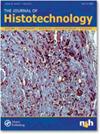Epithelial ovarian carcinoma - a perspective.
IF 1.8
4区 生物学
Q4 CELL BIOLOGY
引用次数: 0
Abstract
The subtypes of epithelial ovarian carcinoma have differing pathophysiology, behavior, molecular alterations, and treatment approaches. As one of the most common malignancies diagnosed in females, ovarian carcinoma has the highest case-to-fatality ratio, primarily due to serous carcinoma presenting at an advanced stage with wide peritoneal metastasis and occasional lymph node metastasis. In comparison, the non-serous carcinomas, which most commonly include endometrioid and clear cell carcinomas, are frequently diagnosed at an early stage. Within serous carcinoma, low-grade and high-grade serous carcinoma are two distinct tumor types. Lowgrade serous carcinoma is thought to arise from precursor lesions like serous borderline tumor. In contrast, high-grade serous carcinoma is not related to a precursor lesion and thought to arise directly from malignant transformation of the ovarian surface epithelium (incessant ovulation theory) or from the epithelium of cortical inclusion cysts (resulting from exfoliated tubal epithelium implanting on the ovarian surface during ovulation). Recently, studies have shown that many high-grade serous carcinomas arise from the tubal fimbria from serous tubal intraepithelial carcinoma, particularly in BRCA-positive patients. BRAF, KRAS, and ERBB2 mutations are important molecular events in low-grade serous carcinoma while high-grade serous carcinoma is almost always associated with a TP53 mutation. Primary ovarian mucinous carcinoma is uncommon and needs workup to exclude metastasis from a gastrointestinal source. Like low-grade serous carcinoma, mucinous carcinoma is shown to arise from the adenoma-carcinoma sequence involving mucinous cystadenoma and mucinous borderline tumor, often coexisting in the same neoplasm. A high percentage of mucinous ovarian carcinomas have KRAS mutations. Most ovarian endometrioid adenocarcinomas are usually low-grade, unilateral and early-stage. They are often associated with endometriosis, endometriotic cyst, or endometrioid borderline tumor. Concurrently, the uterus may demonstrate atypical hyperplasia or endometrioid adenocarcinoma, as molecular events including PTEN, CTNNB1, KRAS and PIK3A mutations are shared between endometrioid adenocarcinoma of the two organs. Primary ovarian clear cell carcinoma occurs with a similar frequency, and shares some features with endometrioid adenocarcinoma, including early stage presentation and association with endometriosis. Recent studies have identified ARID1A mutations in most of these tumors [1].上皮性卵巢癌的观点。
本文章由计算机程序翻译,如有差异,请以英文原文为准。
求助全文
约1分钟内获得全文
求助全文
来源期刊

Journal of Histotechnology
生物-细胞生物学
CiteScore
2.60
自引率
9.10%
发文量
30
审稿时长
>12 weeks
期刊介绍:
The official journal of the National Society for Histotechnology, Journal of Histotechnology, aims to advance the understanding of complex biological systems and improve patient care by applying histotechniques to diagnose, prevent and treat diseases.
Journal of Histotechnology is concerned with educating practitioners and researchers from diverse disciplines about the methods used to prepare tissues and cell types, from all species, for microscopic examination. This is especially relevant to Histotechnicians.
Journal of Histotechnology welcomes research addressing new, improved, or traditional techniques for tissue and cell preparation. This includes review articles, original articles, technical notes, case studies, advances in technology, and letters to editors.
Topics may include, but are not limited to, discussion of clinical, veterinary, and research histopathology.
 求助内容:
求助内容: 应助结果提醒方式:
应助结果提醒方式:


